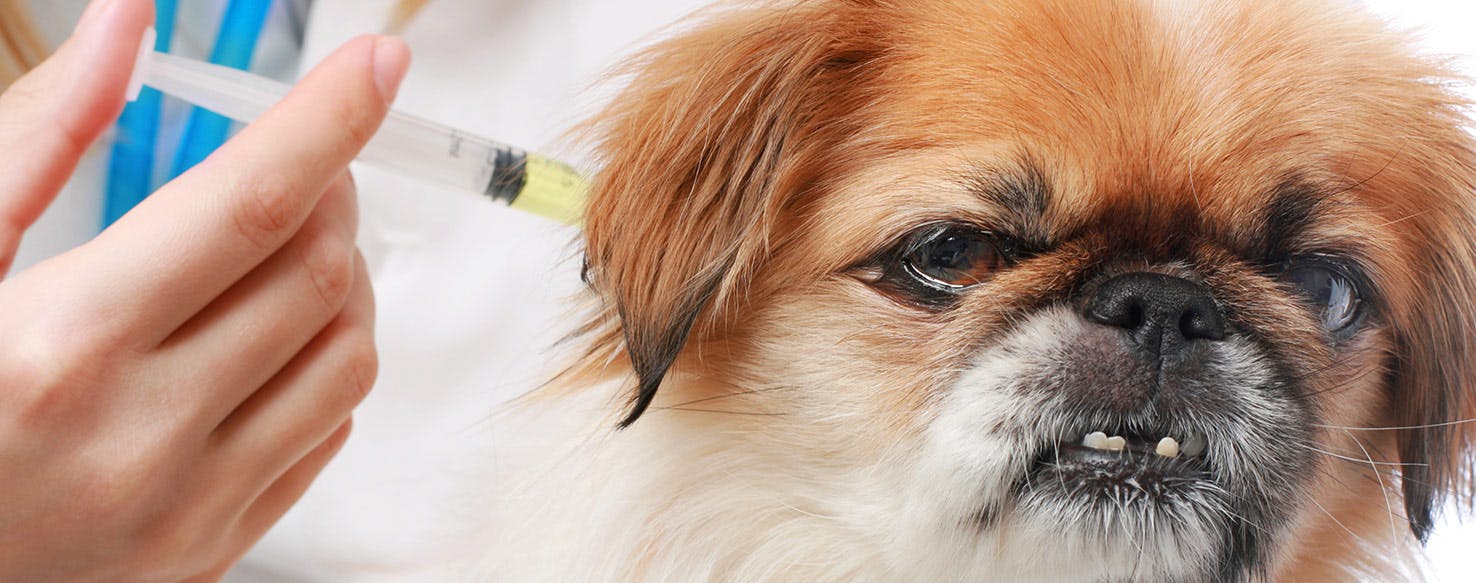- Home
- Dog Wellness
- Can Dogs Get Parvo After Vaccination?
4 min read
Can Dogs Get Parvo After Vaccination?

By Grace Park
Published: 07/23/2017, edited: 09/07/2022
Save on pet insurance for your pet
You don't have to choose between your pet and your wallet when it comes to expensive vet visits. Prepare ahead of time for unexpected vet bills by finding the pawfect pet insurance.
Overview
Dog is man’s best friend and for good reason! People with dogs live longer, their hearts are healthier and they’re happier on average than those without a canine influence in their lives. But whilst our canine friends help us live longer, can they still suffer from the same illnesses and ailments that we can? The parvovirus in humans can lead to severe joint soreness for days and even weeks; it’s extremely contagious and debilitating. But if your dog could get parvo, even after vaccination, it could potentially be lethal, causing a variety of problems such as sepsis. Plus, when it’s so contagious, handling the condition in a dog would need to be done with extreme care. But can a vaccinated dog get parvo?
Can vaccinated dogs get parvo?
Short answer: YES!
Some may think once their dog is vaccinated they can’t catch Parvo, but the virus has different strains and reinvents itself. So unfortunately, dogs definitely can still catch the parvovirus.
Does my dog have parvo?
Parvo is a nasty disease, but catching the signs early may help prevent serious, long-term damage. Does your dog have a fever? Is your dog lethargic? Is your dog constantly vomiting and suffering from diarrhea? Do they have a weak pulse, tachycardia, hypothermia or fluid distention of the intestines? All of these can be symptoms your dog is suffering from parvovirus.
But what even causes parvovirus? Your dog can catch parvo from eating the feces of an infected animal. It can catch it from coming into contact with infected material with the eyes, nose or mouth. If the proper vaccination hasn’t been given to your dog, their chances of catching it are much higher. On top of that, systemic stress from other illnesses can increase the risk of infection.
How will your vet diagnose parvo? ELISA is a common lab test used to detect the viral particles in intestinal parvo. Cardiac parvovirus is very rare and infects puppies whilst still in the uterus, causing stillbirth or death shortly after birth. There is not yet an effective means of diagnosing the mother for this type of Parvo.
How do I treat my dog's parvo?
The immediate things that need to be treated from parvo are the dehydration and electrolyte imbalance from persistent vomiting and diarrhea. Solutions can be administered orally, or an IV may be needed to administer the electrolytes, water and the required nutrients. A sugar solution and potassium may also need to be administered via IV. If the case becomes serious, and GI protein drops below 20g/L, your dog will require colloid therapy such as Pentastarch. Your dog may also require anti-emetics to control the vomiting and antibiotics to treat any infections that take hold whilst the immune system is weakened.
Fortunately, recovery is swift when treated early on. Puppies that are treated promptly can be fully recovered after a week or two, if they survive the first few days. Once vomiting has stopped, the dog can receive all the necessary nutrients and recover quickly. However, it may take several weeks or even months before full recovery.
It can be helpful to read first-hand accounts from other owners, plus take a look at answered questions from our in-house vets.
How is parvo similar in dogs and humans?
There are a lot of striking similarities in the way the parvovirus manifests itself in dogs, humans and other animals. Some of those similar symptoms and causes are:
- In both dogs and humans, individuals can feel lethargic and have a fever.
- Both can also experience extreme loss of appetite and a complete refusal to eat any food.
- Persistent vomiting and diarrhea can be symptoms of parvo in both humans and dogs.
- A weak pulse may also be a big indicator that parvo has taken hold in both dogs and humans.
How is parvo different in dogs and humans?
In a number of ways then, the parvovirus has a lot of similar traits that can be seen in dogs, humans and other animals. But whilst there are similarities, there also certain differences worth highlighting. Some of those differences are:
Humans and dogs are affected by different types of parvo viruses, which cannot be transmitted between the species.
Humans usually have symptoms of red cheeks and joint soreness, not symptoms typically seen in dogs.
Parvovirus often affects very young puppies or puppies that have not even been born. It is more common in humans to contract parvovirus when they are older.
Parvovirus infection in dogs is often much more serious, whereas you don’t always need to see a doctor if you contract it as a human.
Case Study
Aragorn was a 3-year-old Poodle who has already been vaccinated against parvo. But one day he stopped eating his food. He remained in his bed and just seemed to want to sleep. After not eating for a couple of days, he was hospitalized and parvovirus was the diagnosis. With an IV, they fed him Vitamin B, electrolytes and the other nutrients he had lost. They put him on a course of antibiotics and in a couple of weeks he was pretty much back to his old, healthy self. This case showed that even if your dog has been vaccinated they could still catch it. But, if you get parvo diagnosed and treated quickly, it can be dealt with swiftly, without leaving any long-term adverse effects.
Before your dog gets parvovirus, check out our pet insurance comparison tool. Secure pet health insurance today to avoid high veterinary care costs.
You may also like
